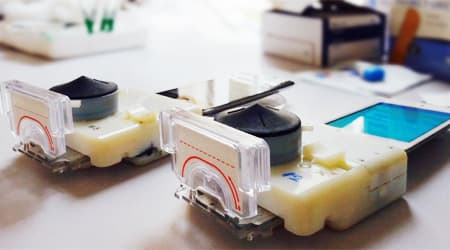Low-cost Smartphone Accessory Tests Blood & Diagnoses HIV In < 15 Minutes
Even with the medical advances of today, the age-old process of blood tests requires the patient to go to the pathology lab, give the blood sample and wait for about 5-6 hours to get the results. Well, a team of biomedical engineering researchers from the Columbia University are about to change all that. They have developed a low-cost smartphone accessory that can be used to perform blood test and detect three infectious diseases (which includes HIV) within a time span of just 15 minutes. The ingenious dongle-like device single-handedly performs all the optical, mechanical and electronic functions of any normal lab based blood test. The device runs on the power derived from the smartphone and hence doesn't need additional power supply.
The small device developed by Columbia University engineers can be easily connected to a smartphone or a PC and used to derive blood from a patient with a single finger prick. This is a major innovation as we are looking at a device capable of performing the job of an entire laboratory. In areas where medical help is not readily available, such a combination of consumer electronics and recent advances in microfluidics can make lab-based diagnostics accessible to almost anyone on the planet with access to smartphones.

In order to cater to places where electricity isn't available 24x7, the team of biomedical engineers made it a point that the accessory consumes as less power as possible. To achieve that, they replaced the electrical pump with “one-push vacuum,†where a user mechanically activates a negative-pressure chamber to move a sequence of reagents pre-stored on a cassette. Other than that, they eliminated the use of batteries, by introducing an audio jack for transmitting power and data, thus making it a plug-n-play device compatible with Android smartphones as well as iPhones.
In their tests, the engineering researchers found that the simple smartphone accessory had a fast turn-around time and had the potential to offer results for multiple diseases. By miniaturizing the diagnostics hardware, health care services can be made available for millions through rapid point-of-care diagnosis centre for diseases such as HIV, syphilis, and other sexually transmitted diseases. An early diagnosis could help reduce adverse consequences. What are your thoughts about that? Share with us in comments below.
Source: #-Link-Snipped-#
The small device developed by Columbia University engineers can be easily connected to a smartphone or a PC and used to derive blood from a patient with a single finger prick. This is a major innovation as we are looking at a device capable of performing the job of an entire laboratory. In areas where medical help is not readily available, such a combination of consumer electronics and recent advances in microfluidics can make lab-based diagnostics accessible to almost anyone on the planet with access to smartphones.

In order to cater to places where electricity isn't available 24x7, the team of biomedical engineers made it a point that the accessory consumes as less power as possible. To achieve that, they replaced the electrical pump with “one-push vacuum,†where a user mechanically activates a negative-pressure chamber to move a sequence of reagents pre-stored on a cassette. Other than that, they eliminated the use of batteries, by introducing an audio jack for transmitting power and data, thus making it a plug-n-play device compatible with Android smartphones as well as iPhones.
In their tests, the engineering researchers found that the simple smartphone accessory had a fast turn-around time and had the potential to offer results for multiple diseases. By miniaturizing the diagnostics hardware, health care services can be made available for millions through rapid point-of-care diagnosis centre for diseases such as HIV, syphilis, and other sexually transmitted diseases. An early diagnosis could help reduce adverse consequences. What are your thoughts about that? Share with us in comments below.
Source: #-Link-Snipped-#
0
